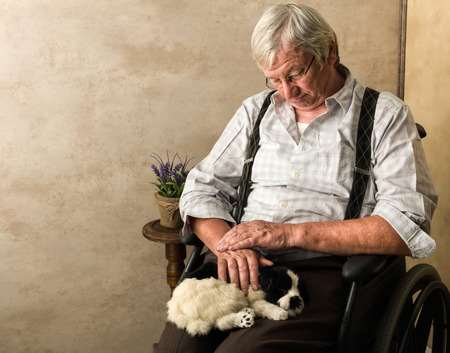Dementia Service Dogs:
The Perfect Job for a Small Breed Dog
Dementia Service Dogs Guest Post by Jessica Hegg |Last Updated August 14, 2019
Small Dogs a Playing a Pivotal Role in Helping Patients with Alzheimer’s.

Coping with Alzheimer’s for both patient and family can be extremely difficult and debilitating.
The progressive disease which is essentially general degeneration of the brain and its ability to form and store memories can lead to dementia and further cognitive decline that prevents someone with it from being able to execute even the simplest task.
Over 5 million people in the United States are estimated to have Alzheimer’s with that number expected to grow increasingly as the whole of the Boomer generation will have aged into the 65+ bracket by 2029.
There are ways to help prevent and combat Alzheimer’s including diet, exercise, and medical intervention - but what about dogs?
Canines make amazing therapy companions and assistive service animals for people with vision and hearing impairment, as well as seizure disorders and autism.
Dementia Service Dogs Benefit Patients
Can dogs be beneficial members of a family with an adult who has Alzheimer’s? Absolutely. Here’s how:
Dogs Love Schedules
An important piece to the puzzle of caring for someone with Alzheimer’s is maintaining a fixed and ready schedule for loved one and caregiver(s) to follow.
From waking, taking medicine, eating, and going to bed, a structured agenda for the day provides stability to the life of someone experiencing memory loss, and helps them commit more actions to procedural (muscle) memory.
How does a dog come into play?
Well canines are also creatures of habit, and a regular schedule for going on walks, eating, and exercising plays right into their natural instincts.
A docile, obedient and loving canine companion could offer helpful reminders to someone with Alzheimer’s, help them feel more in control of managing their own schedule, and prevent ‘sundowning.’ Sundowner’s disease symptoms might include outbursts, anger, memory loss and confusion in the evening hours by a senior with Alzheimer’s because their natural sleep/wake cycle has been altered by brain damage.
A dog which they know to walk and feed every evening may help serve as a time peg in a schedule that combats sundowning.
Dogs Need Exercise (and So Do People)
And so do humans! Older adults with Alzheimer’s especially benefit from regular physical fitness because it helps prevent other ailments like heart disease, high blood pressure, and obesity which can complicate their existing condition.
Exercise in itself also boosts blood flow to the muscles and brain, and provides cognitive stimulation to help combat general decline.
Just like humans, dogs should get at least 30 minutes of low-impact exercise daily whether it’s going on walks, hiking, swimming, you name it.
Canine breeds like Shih Tzu and Pugs are perfect dog breeds for seniors - their small, docile lower-energy nature pairs well with an older adult looking for an easy dog to walk and also relax with.
Dementia Service Dogs Can Provide Safety
In addition to the general security even small dogs like Boston Terriers and Maltese’s can provide (alerting owners to alarms, phone rings, doorbells, etc by barking), “Dementia Service Dogs” are providing medical service that is changing the way adults with Alzheimer’s live.
Specially trained and GPS-tracked Dementia Dogs both prevent a person with Alzheimer’s from leaving their house unaccompanied, as well as help their owners get back to the safety of their own home with a simple command.
They can also help wake their owners up and remind them of where their belongings are (like their clothes for the day or their medicine).
Dementia Service Dogs Provide Purpose
The onset of Alzheimer’s is often accompanied by myriad feelings of frustration, confusion, agitation and anxiety.
Being unable to recall a name or getting outside and forgetting what you were doing can be stark, and scary realizations. Fighting those emotions with positive feelings of confidence and self-reliance can be supported in part by caring for a dog.
A pet which returns unconditional love and which needs the care of an owner can help drive a purposeful life for someone battling Alzheimer’s.
Other Things to Consider
It is important to remember that pets can be safety hazards for the elderly especially because of their ability to trip or unbalance their owner.
If owning a dog isn’t an option for you or your loved one with Alzheimer’s, fostering a pet, volunteering at an animal shelter, or suggesting a resident dog join a long-term care facility may be more viable options.
Jessica
Hegg is the content manager at ViveHealth.com. Interested in all things related
to living a healthy lifestyle she works to share valuable information aimed at
overcoming obstacles and improving the quality of life for others.
About Janice (author and voice behind this site)
Having lived with dogs and cats most of her life, Janice served as a veterinary technician for ten years in Maryland and twelve years as a Shih Tzu dog breeder in Ohio.
Her education includes undergraduate degrees in Psychology with a minor in biology, Early Childhood Education, and Nursing, and a master's in Mental Health Counseling.
She is a lifelong learner, a dog lover, and passionate about the welfare of animals. Her favorite breed for over 50 years has been the Shih Tzu, but she has also lived with Poodles, Maltese, Yorkshire Terriers, Beagles, English Bulldogs, Carin Terriers, and a Cocker Spaniel.
When not writing, reading, and researching dog-related topics, she likes to spend time with her eight Shih Tzu dogs, husband, and family, as well as knitting and crocheting. She is also the voice behind Miracle Shih Tzu and Smart-Knit-Crocheting
Does This Article Deserve Your Thumbs Up?
We always appreciate your support and encouragement. Your thumbs up means so much to us. Please like this article.
If you find this page or any page on Small Dog Place Helpful, or useful in anyway, I'd love it if you would click the small heart found on the bottom right of each page.
You can also share or bookmark this page -- just click on the:

Free Monthly Newsletter
Sign Up for Our Free Newsletter and get our Free Gift to You.
my E-book, The Top 10 Mistakes People Make When Choosing a Dog (and how to avoid them)






